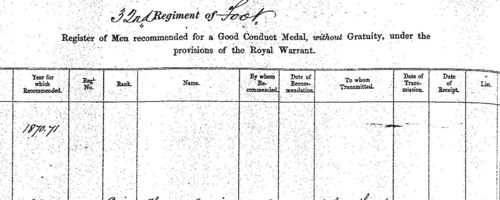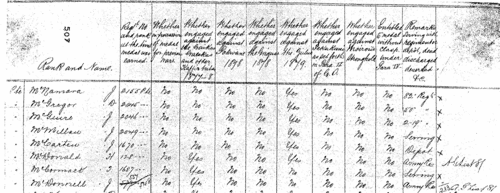Mcdonagh Surname Ancestry ResultsOur indexes 1800-1900 include entries for the spelling 'mcdonagh'. In the period you have requested, we have the following 25 records (displaying 1 to 10): Single Surname Subscription | | | Buying all 25 results of this search individually would cost £168.00. But you can have free access to all 25 records for a year, to view, to save and print, for £100. Save £68.00. More... |
These sample scans are from the original record. You will get scans of the full pages or articles where the surname you searched for has been found. Your web browser may prevent the sample windows from opening; in this case please change your browser settings to allow pop-up windows from this site.  London Policemen
(1843-1857) London Policemen
(1843-1857)
The Metropolitan Police Register of Joiners (MEPO 4/334) lists policemen joining the force 1 January 1843 to 1 April 1857 (warrant numbers 19893 to 35804). The register is alphabetical, in so far as the recruits are listed chronologically grouped under first letter of surname. It gives Date of Appointment, Name, Number of Warrant, Cause of Removal from Force (resigned, dismissed, promoted or died), and Date of Removal. Although the register was closed for new entrants at the end of 1842, the details of removals were always recorded, some being twenty or more years later. Those recruits not formerly in the police, the army, or some government department, were required to provide (normally) at least two letters of recommendation from persons of standing, and details of these are entered on the facing pages: the names in these are indexed separately - this index refers only to the police constables. Where a recruit was only recently arrived in the metropolis, the names and addresses of the recommenders can be invaluable for tracing where he came from.MCDONAGH. Cost: £8.00.  | Sample scan, click to enlarge

|  Sailors and marines awarded the Baltic Medal
(1854-1857) Sailors and marines awarded the Baltic Medal
(1854-1857)
During the Crimean War, a British and French fleet entered the Baltic, and captured Bomarsund harbour and one of the Aland Islands (now part of Finland). Bomarsund is the sound between the islands and the Swedish island of Vardo; and at the fine harbour on Bomarsund, dominating the entrance of the Gulf of Bothnia, and indirectly that of the Gulf of Finland, the Russians had constructed a northern naval base, and this was destroyed in the attack. The British fleet taking part in the Baltic expedition comprised Her Majesty's ships Aeolus, Ajax, Alban, Algiers, Amphion, Archer, Arrogant, Basilisk, Belleisle, Blenheim, Boscawen, Bulldog, Caesar, Calcutta, Centaur, Colossus, Conflict, Cornwallis, Cossack, Cressy, Cruizer, Cuckoo, Cumberland, Dauntless, Desperate, Dragon, Driver, Duke of Wellington, Edinburgh, Esk, Euryalus, Exmouth, Falcon, Firefly, Geyser, Gladiator, Gorgon, Hannibal, Harrier, Hastings, Hawke, Hecla, Hogue, Imperieuse, James Watt, Leopard, Lightning, Locust, Magicienne, Majestic, Merlin, Miranda, Monarch, Neptune, Nile, Odin, Orion, Otter, Pembroke, Penelope, Pigmy, Porcupine, Prince Regent, Princess Royal, Pylades, Resistance, Retribution, Rhadamanthus, Rosamond, Royal George, Royal William, Russell, St George, St Jean D'Acre, St Vincent, Sphinx, Stromboli, Tartar, Termagant, Tribune, Tyne, Valorous, Volage, Volcano, Vulture, Wrangler and Zephyr. This is the medal roll of the naval and marine claimants who qualified for the Baltic Medal for service in 1854 to 1855. The medals were dispatched in batches from early 1857, the first batch being numbered B A 1, the next B A 2, &c.; then follows the destination (a place or, more usually, a ship) and the date of dispatch. Most of the medals had been sent by the end of 1857.MCDONAGH. Cost: £8.00.  | Sample scan, click to enlarge

| Destitution in Donegal (1858)
Hearing of extreme distress in Gweedore and Cloughaneely in Donegal (including Tory Island), an investigation was made by a group of clergymen, gentlemen and newspaper reporters, who found a large part of the populace (800 families) to be in severe poverty - clad in rags, barefoot, living in mud hovels, without furniture, beds or bedding, and subsisting for much of the year only by scavenging seaweed and shellfish from the seashore - beset by rapacious landlords (with their apparatus of lawyers and bailiffs) raising their rents and confiscating the mountain lands on which the poor had relied for pasture. A parliamentary Select Committee was appointed to investigate: its report includes detailed minutes of evidence of their investigations, including testimony relating to many named individuals who had coped with the local crisis and survived, or those who died, and lists of those whose cases had been looked into. The landlords rebutted any suggestion of impropriety, suggesting that when the investigation was made 'a great deal was got up for the occasion' by an inherently dirty peasantry that kept their animals in their houses, in the hope of obtaining relief money (which, to the tune of £3,200, had been received, mainly from England). Seaweed was remarkably nutritious. It was remarked that 'some of the men go to England and Scotland to earn money' and that 'a few young people emigrate yearly to join their relations in America and Australia'.
MCDONAGH. Cost: £8.00.  | Sample scan, click to enlarge

|  Men of the 14th Regiment who fought in the New Zealand War
(1863-1870) Men of the 14th Regiment who fought in the New Zealand War
(1863-1870)
New Zealand War Medal roll for the 2nd battalion of the 14th (Buckinghamshire) Regiment of Foot: for service in the New Zealand campaign 1863 to 1867: the rolls were compiled following a general order in 1869 and the medals were distributed in 1870. The 2nd battalion, despite being part of the Buckinghamshire Regiment, was raised at Mullingar in Westmeath in 1857, and was sent to New Zealand in 1860, where it took part in the war of 1863 to 1865. In 1866 the men were sent to Australia, returning to England in 1870.MCDONAGH. Cost: £8.00.  | Sample scan, click to enlarge

| Unclaimed Money and Property
(1870)
Gun & Co. of 6 Prince of Wales' Road, London, in about 1870 published this fifth 'List of Next of Kin & Heirs, &c., who have been Advertised for in the English, Irish, Scotch, United States of America, Canadian, Australian, East and West Indian, and other Newspapers, since 1704. Money & Property to the value of many Millions Sterling want Claimants'. The list of 4,128 names gives surname, christian name, and, occasionally, locality. Copies of the actual advertisements were furnished to enquirers by the company at a cost of six shillings. MCDONAGH. Cost: £6.00.  | Sample scan, click to enlarge

| National Bank Shareholders
(1873)
Copy of the return by the National Bank to the Inland Revenue listing the 'persons of whom the Company or partnership consists', pursuant to 7 & 8 Vic. cap. 32: giving full name (surname first), residence and occupation (often not stated). Although the bank branches listed are all in London, almost all the shareholders were resident in Ireland.MCDONAGH. Cost: £4.00.  | Sample scan, click to enlarge

|  Outstanding soldiers of the 108th (Madras Infantry) Regiment of Foot
(1870-1875) Outstanding soldiers of the 108th (Madras Infantry) Regiment of Foot
(1870-1875)
Each year just a handful of outstanding soldiers of the regiment were chosen for good conduct medals and gratuities: these are listed here. There were two lists, one for men recommended for the Good Conduct Medal without a gratuity, and one for gratuities - £5 to a private, £10 to a corporal, and £15 to a serjeant. Both lists are indexed here, and each gives rank, name, regimental number, date of recommendation and date of issue. (The sample scan is from the 32nd foot). MCDONAGH. Cost: £8.00.  | Sample scan, click to enlarge

|  Men of the 24th Regiment of Foot (2nd Warwickshire) fighting in South Africa
(1877-1879) Men of the 24th Regiment of Foot (2nd Warwickshire) fighting in South Africa
(1877-1879)
What is commonly called the Zulu War Medal was awarded to those British soldiers who fought in a series of conflicts in southern Africa from 1877 (the Kaffir War) through to 1879 (the Zulu War). In 1880 the various units submitted returns of the officers, non-commissioned officers and men 'entitled to the Medal for Military Operations in South Africa during 1877-8-9' and these 'medal rolls' are now in the National Archives. The returns are made with the information arranged in twelve columns:
1. Rank and name
2. Regimental number and rank at the time the medal was earned
3. Whether in possession of medal for previous wars
4. Whether engaged against the Gaikas, Galekas and other Kaffir tribes 1877-8
5. Whether engaged against Pokwane 1878
6. Whether engaged against the Griquas 1878
7. Whether engaged against the Zulus 1879
8. Whether engaged against Sekukuni as set forth in Par. 2. G. O.
9. Whether engaged against Moirosi's stronghold
10. Entitled to medal without clasp under Par. 4.
11. Serving with regiment, depot, dead, discharged, deserted, &c.
12. Notes and cross-references to the Adjutant-General's medal lists.
WO 100/46.
MCDONAGH. Cost: £8.00.  | Sample scan, click to enlarge

| Irish Debtors and Bankrupts
(1880)
Bills of sale (binding assets to a creditor/lender), and bankruptcies in Ireland, October to December 1880MCDONAGH. Cost: £6.00.  | Sample scan, click to enlarge

|  Outstanding soldiers of the 12th (East Suffolk) Regiment of Foot
(1875-1881) Outstanding soldiers of the 12th (East Suffolk) Regiment of Foot
(1875-1881)
Each year the best soldiers of the regiment were chosen for long service and good conduct medals. This register gives rank, name, regimental number, and date of recommendation. (The sample scan is from the 34th foot). The register is essentially a register of recommendations, but from 1877-8 onwards there are also details of the issue of the medals. The 1st battalion was sent out to the East Indies in 1876, taking part in the Afghan war of 1878 to 1880.MCDONAGH. Cost: £8.00.  | Sample scan, click to enlarge

|
Research your ancestry, family history, genealogy and one-name study by direct access to original records and archives indexed by surname.
|













